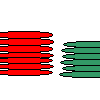Skip over navigation
Once you've had a go at Level 1, you can click on the purple cog to access the Settings menu and try Levels 2 and 3.

Or search by topic
Number and algebra
Geometry and measure
Probability and statistics
Working mathematically
Advanced mathematics
For younger learners
Diamond Collector
Age 11 to 16
Challenge Level 





In the game below, twenty diamonds have been placed on a grid.
You can enter the equations of three straight lines.
Any diamond that lies on one of your lines counts towards your total.
Try to collect as many diamonds as you can!
Once you've had a go at Level 1, you can click on the purple cog to access the Settings menu and try Levels 2 and 3.
Related Collections
You may also like
Nim
Start with any number of counters in any number of piles. 2 players take it in turns to remove any number of counters from a single pile. The loser is the player who takes the last counter.

